For many dog lovers, the joy of welcoming a furry friend into their home often comes with a less appealing reality: dog hair. Shedding can be a constant battle, clinging to clothes, furniture, and dominating vacuum cleaner duties. But what if you could have the companionship of a delightful canine without the endless cleanup? You’re in luck! There’s a wonderful world of small breed dogs that don’t shed, or shed very minimally, making them ideal for allergy sufferers, those seeking a cleaner home, or simply anyone who prefers less fur. This comprehensive guide will introduce you to some of the most charming, low-shedding small dog breeds, helping you find the perfect match for your lifestyle.
Why Choose a Small Dog That Doesn’t Shed?
The appeal of a small, non-shedding dog extends beyond just a clean home. These breeds offer a unique set of benefits that make them incredibly popular companions. Firstly, for individuals with pet allergies, hypoallergenic dog breeds—which often happen to be non-shedding or low-shedding—can be a game-changer, allowing them to experience the unconditional love of a dog without the discomfort of allergic reactions. While no dog is 100% hypoallergenic, those that shed less release fewer dander-laden hairs into the environment. Furthermore, less shedding means a reduced “doggy odor” for many breeds and significantly less time spent on cleaning and vacuuming. If you’re looking for the best small inside dogs that don’t shed, these characteristics are certainly a top priority.
Understanding Non-Shedding vs. Low-Shedding Coats
It’s important to clarify the difference between “non-shedding” and “low-shedding” as well as the concept of “hair” versus “fur.” Most dogs have a coat of “fur” that grows to a certain length and then sheds according to seasonal cycles or growth phases. Non-shedding dogs, however, often have “hair” that grows continuously, similar to human hair. This hair doesn’t fall out as readily, instead getting caught in the coat itself. While this dramatically reduces the amount of hair released into your home, it also means these coats require regular grooming, brushing, and sometimes professional trimming to prevent matting and tangles. A non-shedding coat doesn’t mean a maintenance-free dog; it simply shifts the maintenance from cleaning up shed hair to dedicated grooming routines.
Top Small Dog Breeds That Don’t Shed
Here are some of the most beloved and well-suited small dog breeds known for their minimal to non-existent shedding, making them excellent choices for various households. For a comprehensive overview of types of small dogs that don’t shed, explore these fantastic options.
Affenpinscher
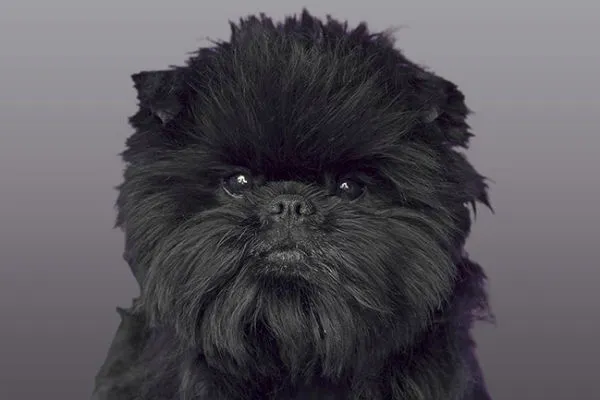 A black wire-haired Affenpinscher dog with a distinctive monkey-like face, a small breed that doesn't shed much.
A black wire-haired Affenpinscher dog with a distinctive monkey-like face, a small breed that doesn't shed much.
The Affenpinscher, whose name translates to “monkey-like terrier,” perfectly embodies its intelligent and playful nature. Despite their small stature, these Toy Group dogs are fearless and make excellent watchdogs. Their wiry coat is a standout feature, shedding very little and possessing almost no “doggy odor,” which is a huge bonus for owners. A twice-weekly brushing with a slicker brush and comb is typically sufficient to keep them looking neat and shaggy. These low-maintenance canines are also known for their entertaining sense of humor.
Basenji
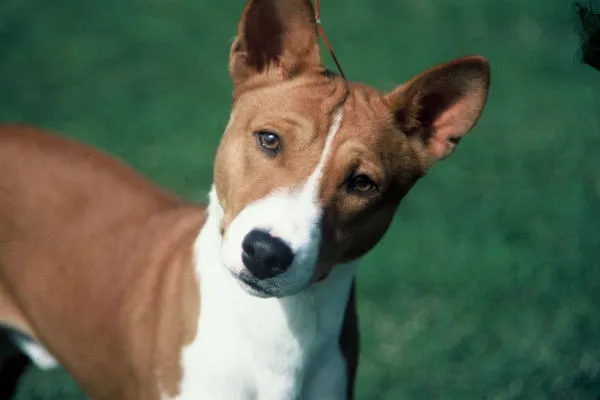 A lean, short-coated Basenji dog with erect ears, a breed known for minimal shedding and unique "barkless" trait.
A lean, short-coated Basenji dog with erect ears, a breed known for minimal shedding and unique "barkless" trait.
For those who admire the elegant appearance of hounds but wish to avoid their typical shedding and distinctive scent, the Basenji offers a compelling alternative. This small breed sheds very minimally, and its short, fine coat requires little more than occasional brushing to stay in top condition. Basenjis are also famously quiet, often referred to as “barkless” dogs, making them an excellent choice for apartment living, provided they receive adequate daily exercise and mental stimulation.
Bichon Frise
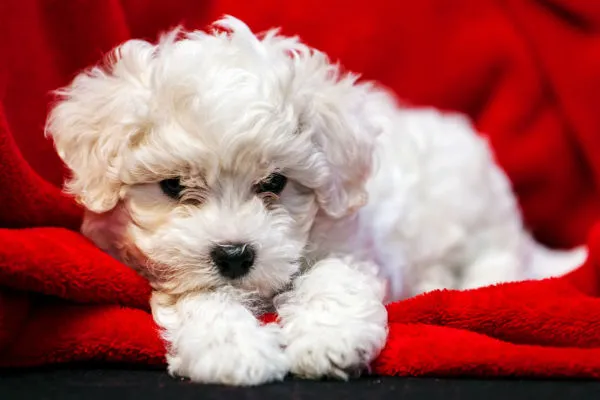 A fluffy white Bichon Frise with a charming expression, a truly non-shedding and playful small dog breed.
A fluffy white Bichon Frise with a charming expression, a truly non-shedding and playful small dog breed.
The Bichon Frise is truly a poster child for non-shedding small dog breeds. These joyous, affectionate dogs are often considered an ideal choice for people with allergies due to their continuously growing hair. However, “non-shedding” doesn’t mean “maintenance-free.” Their signature powder-puff coat demands frequent grooming, daily brushing, and regular baths to prevent matting and maintain their adorable appearance.
Bolognese
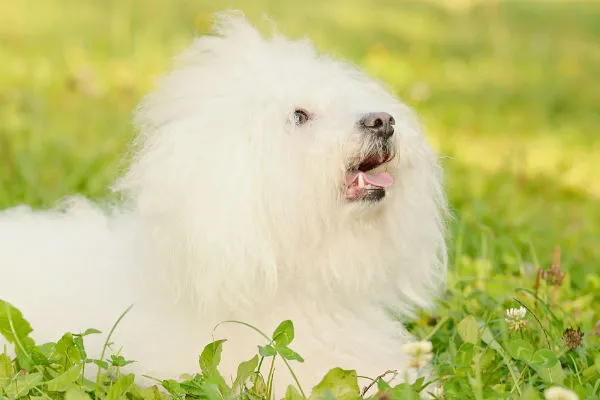 A white fluffy Bolognese dog with a distinctive curly coat, a non-shedding breed similar to the Bichon Frise.
A white fluffy Bolognese dog with a distinctive curly coat, a non-shedding breed similar to the Bichon Frise.
Much like their cousin, the Bichon Frise, the Bolognese boasts a distinctive fluffy coat composed of hair rather than traditional fur. The Bolognese does not shed, but it’s crucial to understand that dead hair must be brushed out regularly. This lovable lap dog’s coat requires daily grooming to prevent tangles and keep them looking their absolute best. Their sweet and gentle disposition makes the grooming effort a rewarding experience.
Brussels Griffon
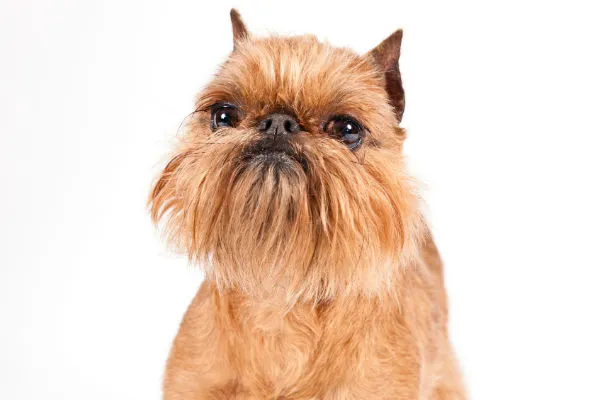 A small, rough-coated Brussels Griffon dog with expressive eyes and a characteristic beard, a loyal and minimal shedding breed.
A small, rough-coated Brussels Griffon dog with expressive eyes and a characteristic beard, a loyal and minimal shedding breed.
Don’t let the small size of the Brussels Griffon fool you; this breed is known for its sturdy and spirited nature rather than needing constant pampering. Both the smooth-coated and rough-coated varieties of the Brussels Griffon are minimal shedders and thrive with regular grooming. Their compact size means that daily walks combined with indoor play typically meet their exercise requirements. These loyal little dogs form strong bonds with their families and do best in homes where they receive plenty of companionship.
Chinese Crested
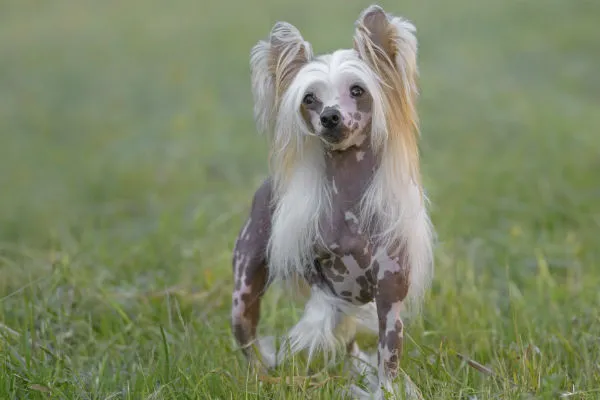 A hairless Chinese Crested dog with tufts of hair on its head, tail, and paws, a unique non-shedding small breed.
A hairless Chinese Crested dog with tufts of hair on its head, tail, and paws, a unique non-shedding small breed.
If minimizing shedding is your primary goal, a hairless dog breed like the Chinese Crested is an excellent option. Chinese Cresteds come in two distinct coat types: hairless and powderpuff. The hairless variety features elegant tufts of hair on their head, tail, and feet, while the powderpuff is covered in a soft, fine coat that sheds very minimally. Hairless breeds do require special skincare, including protection from sun and cold, and attention to potential skin irritations.
Coton De Tulear
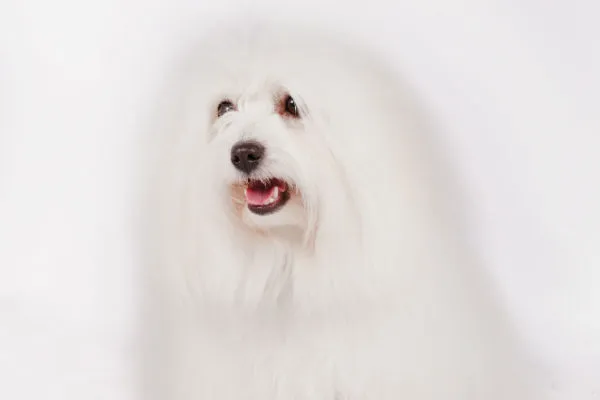 A white fluffy Coton de Tulear dog with a long, soft coat, a hypoallergenic and lighthearted small breed.
A white fluffy Coton de Tulear dog with a long, soft coat, a hypoallergenic and lighthearted small breed.
The Coton de Tulear is easily recognizable by its unique, long, and fluffy coat, which is widely considered hypoallergenic. This makes them a superb choice for individuals with allergies and those who desire a small dog that doesn’t shed. While their beautiful coats do demand daily grooming to prevent matting, their cheerful, gentle, and affectionate personalities make the effort entirely worthwhile for their devoted owners.
Havanese
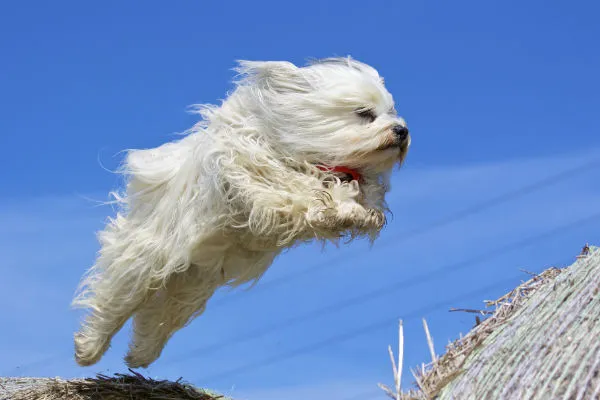 A fluffy Havanese dog with long, flowing hair and an intelligent expression, a charming non-shedding small breed.
A fluffy Havanese dog with long, flowing hair and an intelligent expression, a charming non-shedding small breed.
These delightful native Cuban dogs offer their owners a winning combination of spunky charm and a coat that genuinely doesn’t shed. This means less time spent lint rolling your furniture and more quality time playing and bonding with your lively Havanese. Their silky, flowing coat requires weekly brushing and regular baths to maintain its cleanliness and health, ensuring they always look their best.
Maltese
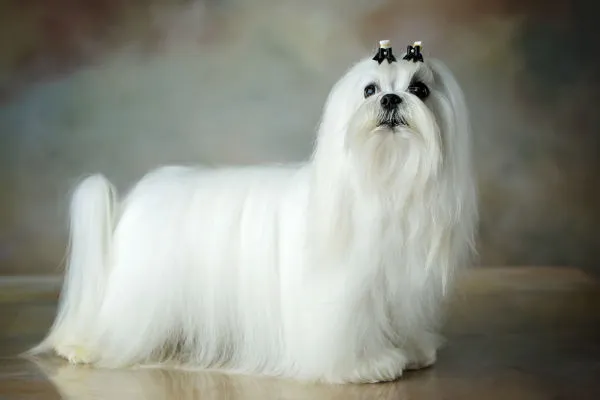 A pristine white Maltese dog with long, silky hair, a charming and low-shedding ancient lap dog.
A pristine white Maltese dog with long, silky hair, a charming and low-shedding ancient lap dog.
Maltese dogs have captivated human hearts for over three millennia, a testament to their enduring appeal. This ancient dog of Malta has maintained much of its original charm, partly due to its long, white coat that sheds very little, making them ideal lap dogs. Their luxurious coats do require consistent brushing to prevent tangles and mats. Occasional baths are also necessary to keep their silky hair clean and free from dirt or debris.
Lhasa Apso
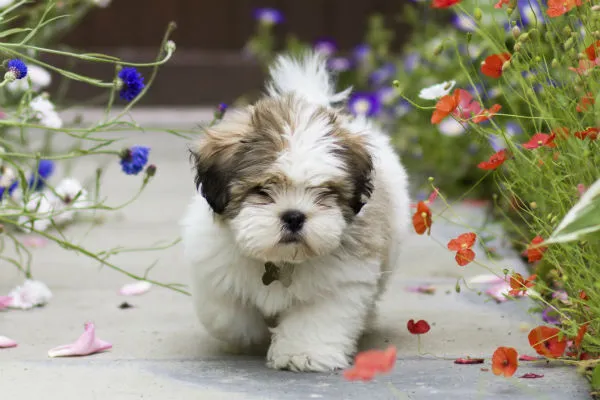 A long-haired Lhasa Apso dog with a calm demeanor, a non-shedding small breed from Tibet.
A long-haired Lhasa Apso dog with a calm demeanor, a non-shedding small breed from Tibet.
Originating from the mountains of Tibet, the Lhasa Apso is an excellent companion known for being calm yet playful. This small breed enjoys leisurely walks and is equally content resting on its owner’s lap. Lhasa Apsos are non-shedding, but their abundant coats do require significant maintenance. Many owners opt for a shorter “puppy cut” to minimize daily grooming and brushing of their long, flowing hair.
Miniature Schnauzer
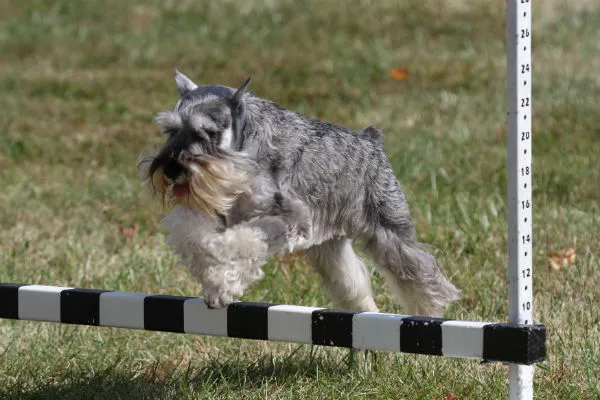 A distinctive salt-and-pepper Miniature Schnauzer dog with a prominent beard and eyebrows, a smart and low-shedding terrier.
A distinctive salt-and-pepper Miniature Schnauzer dog with a prominent beard and eyebrows, a smart and low-shedding terrier.
The Miniature Schnauzer is a smart, highly trainable, and cheerful small dog that bears a striking resemblance to its larger Standard Schnauzer cousin. This robust Terrier breed sheds very little, making them a fantastic choice for those concerned about loose hair. Their adaptability allows them to thrive equally well in city apartments or country homes, as long as they are close to their human companions. To keep a Miniature Schnauzer looking its best, regular grooming and weekly brushing are essential. This breed is also a great example of a small smart dog breed that doesn’t shed.
Poodle (Miniature and Toy)
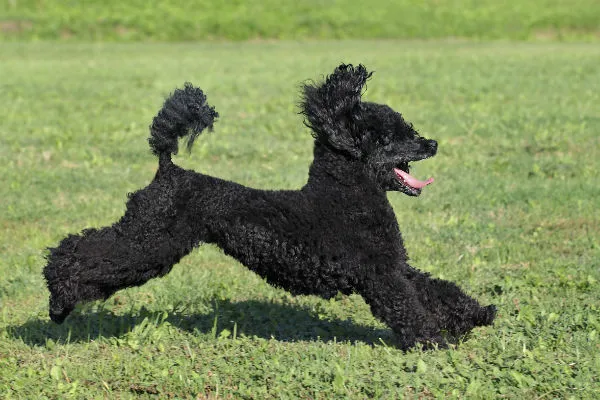 A elegantly groomed Poodle with a curly coat, representing the highly intelligent and non-shedding breed.
A elegantly groomed Poodle with a curly coat, representing the highly intelligent and non-shedding breed.
When people think of small dogs that don’t shed, Poodles often come to mind first, and for good reason. Poodles are renowned for being non-shedding and hypoallergenic. Miniature and Toy Poodles offer these desirable qualities in intelligent, petite packages, differing only in size from their Standard counterparts. All Poodles are exceptionally intelligent, making them highly trainable and active. Their distinctive curly hair requires regular professional grooming to maintain its health and appearance. If you’re looking for top 10 small dogs that don’t shed, a Poodle is almost certainly on the list.
Scottish Terrier
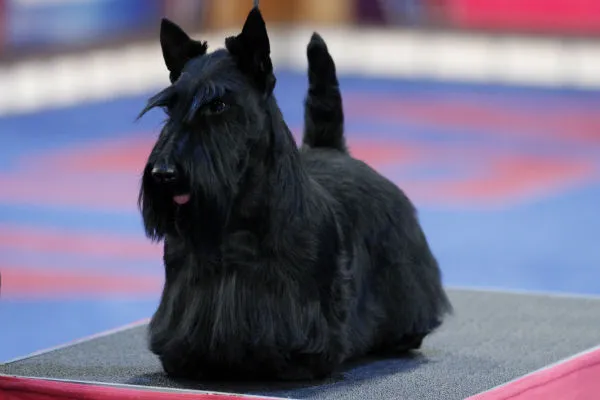 A black Scottish Terrier with a wiry coat and confident stance, a bold and low-shedding terrier breed.
A black Scottish Terrier with a wiry coat and confident stance, a bold and low-shedding terrier breed.
The Scottish Terrier, affectionately known as a Scottie, is a Terrier breed celebrated for its boldness, confidence, and formidable personality. Its wiry, weather-resistant double coat sheds very little. However, Scotties require regular brushing, professional grooming, and occasional hand-stripping to maintain coat health and their distinctive silhouette. These clever and independent dogs possess strong prey drives, so owners should exercise caution around smaller animals.
Shih Tzu
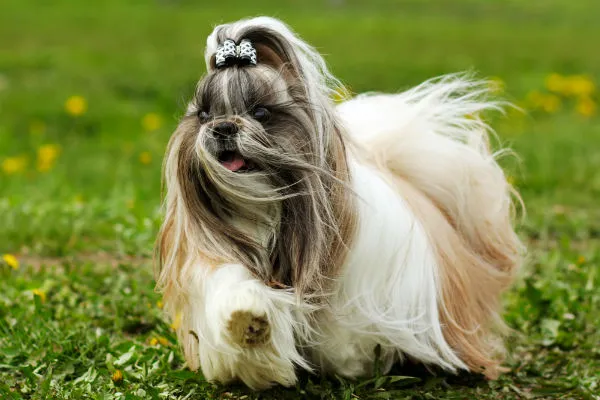 A long-haired Shih Tzu with a regal expression and topknot, a low-shedding Toy breed with royal ancestry.
A long-haired Shih Tzu with a regal expression and topknot, a low-shedding Toy breed with royal ancestry.
The Shih Tzu is another breed with a long and illustrious pedigree, once the favored house pet of the Tang Dynasty emperors. These “little lion dogs” come in a beautiful array of colors and patterns. Their long, silky hair is very low-shedding and looks exceptionally regal when meticulously brushed out, reflecting their royal heritage. This sturdy and lively Toy breed often carries itself with an “arrogant” carriage, due to its proudly held head and curling tail. Bred specifically to be house pets, their gentle and trusting nature makes them exceptional and affectionate companions.
West Highland White Terrier
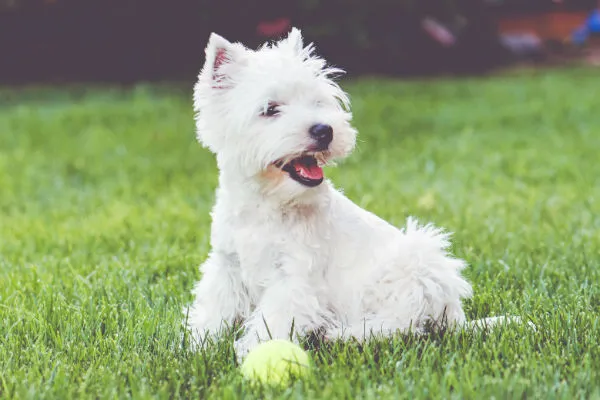 A cheerful white West Highland White Terrier ("Westie") with a coarse coat, an intelligent and low-shedding terrier.
A cheerful white West Highland White Terrier ("Westie") with a coarse coat, an intelligent and low-shedding terrier.
The coarse, white coat of the West Highland White Terrier, fondly known as Westies by their enthusiasts, sheds very little. These sturdy little dogs are intelligent, fiercely loyal, perpetually happy, and incredibly entertaining. Westies are curious dogs with moderate energy levels and possess the independent streak common among all Terriers, which can sometimes present a delightful challenge during training.
Xoloitzcuintli
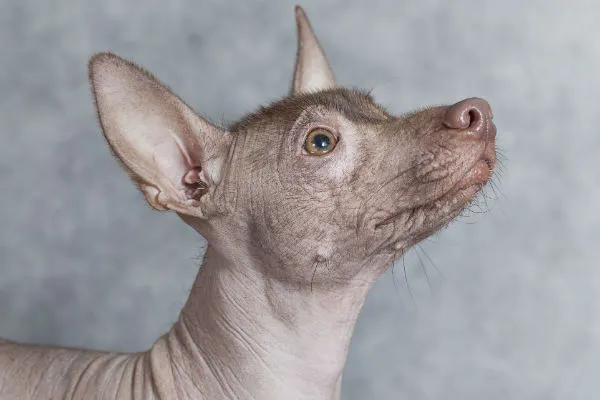 A hairless Xoloitzcuintli (Mexican Hairless dog) with dark skin, an ancient and rare non-shedding breed.
A hairless Xoloitzcuintli (Mexican Hairless dog) with dark skin, an ancient and rare non-shedding breed.
Also known as the Mexican Hairless, the Xoloitzcuintli is an ancient and relatively rare breed that comes in both hairless and coated varieties. Hairless Xolos retain only a small amount of hair on their heads, while the coated variety has a very short, fine coat that sheds minimally. As with other hairless breeds, Xolos require extra attention to their skin, including protection from the elements. Xolos are attentive watchdogs and affectionate companions, known for their tranquil demeanor around the home despite enjoying physical activities like vigorous play and walks.
Yorkshire Terrier
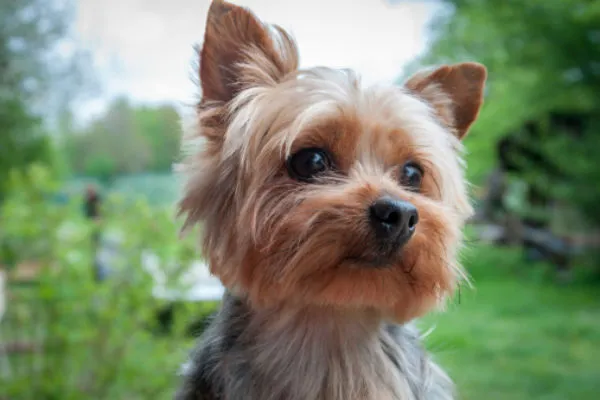 A spirited Yorkshire Terrier ("Yorkie") with long, silky hair and a bold personality, a non-shedding Toy breed.
A spirited Yorkshire Terrier ("Yorkie") with long, silky hair and a bold personality, a non-shedding Toy breed.
Sprightly, tenacious, and incredibly affectionate, the Yorkshire Terrier, often called a Yorkie, is a Toy breed brimming with personality. These spunky lap dogs are consistently among the most popular breeds, and for good reason. Yorkshire Terriers do not shed, and their silky coats are stunning when brushed out daily—a task made easy by their small size. Don’t be fooled by their regal carriage; Yorkies have working-class roots, having hunted rats in English clothing mills. Today, they are just as content being doted upon on their owner’s lap as they are exploring.
Essential Care Tips for Non-Shedding Small Dogs
While the primary benefit of these breeds is their minimal shedding, it’s crucial to remember that “non-shedding” doesn’t equate to “no maintenance.” Here are some essential care tips:
- Regular Grooming and Brushing: Since their hair grows continuously and doesn’t fall out, it can easily mat if not brushed regularly (often daily or every other day). This prevents tangles, skin irritation, and keeps their coat healthy.
- Professional Grooming: Many non-shedding breeds, especially those with continuously growing coats like Poodles or Bichons, require regular trims by a professional groomer every 4-8 weeks to maintain their coat length and prevent matting.
- Skin Care (for Hairless Breeds): Hairless breeds like the Chinese Crested and Xoloitzcuintli need special attention to their skin. This includes protection from sunburn (sunscreen or clothing) and cold weather, as well as regular moisturizing to prevent dryness.
- Dental Hygiene: Small breeds are often prone to dental problems. Regular teeth brushing at home and professional dental cleanings are vital for their overall health.
- Nutrition and Exercise: Like all dogs, non-shedding small breeds need a high-quality diet tailored to their size and activity level, along with consistent exercise to keep them healthy and happy.
Conclusion
Choosing a small breed of dog that doesn’t shed offers numerous advantages, from a cleaner home environment to being a fantastic option for allergy sufferers. The breeds listed above showcase a diverse range of temperaments and appearances, ensuring there’s a low-shedding companion for nearly every preference. Remember that while these dogs minimize hair cleanup, they often require diligent grooming to keep their unique coats healthy and beautiful. Thoroughly research each breed to find the dog that best aligns with your lifestyle and personality. Always prioritize purchasing a puppy from a reputable breeder, ensure they receive a high-quality diet, and schedule regular veterinary checkups to ensure a long, healthy, and happy life for your new furry family member. For more insights into finding your ideal companion, explore our resources on small non-shedding dogs for sale and responsible pet ownership.
